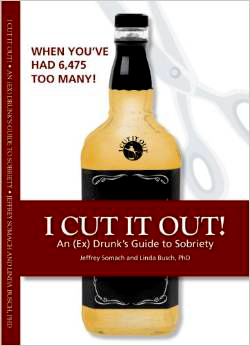|
Judgement Free Care!
Dr. Busch provides compassionate private care for individuals dealing with substance abuse issues and for their family members. She and her late husband co-authored a book for getting started on the road to recovery based on his own personal journey of recovery. Dr. Busch firmly believes that how a person gets sober is not necessarily the way they stay sober. She works with people at every stage of recovery, whether learning coping skills and accessing resources to start out or working through deeper personality and family issues for people in long term recovery.
"I Cut It Out! An (Ex) Drunk's Guide To Sobriety"
Revised 2nd Edition Coming Soon!
|

Coming Soon as an eBook
|
How do I know if I am an Alcoholic or an Addict?
There are many different types of alcoholism and addiction. Some people might use daily while others are binge drinkers or users. Some may just abuse substances on weekends, or even just a few times a year.
The question to ask yourself is not "How much or how often do I drink or use drugs?"
The question to ask is "What happens when I drink or use drugs?"
Some people with an alcohol or drug problem may experience very serious negative effects even after just one or two drinks. If you have had more than one blackout or are told you "become a different person" with a personality change while using, even if you use just a small amount, it is highly likely you have a substance abuse problem.
When Should You Seek Help?
Perhaps your marriage or relationship is in shambles, or your job is at risk. You may have received a DUI or be experiencing other legal problems related to drinking or substance use. Your physical health may be at risk or you may find that drinking has made other problems, such as depression, worse. Your family life may have deteriorated, you may be isolated and alone, or feeling "sick and tired of feeling sick and tired." You should seek help immediately when you are beginning to recognize that substance abuse is negatively impacting your life.
If you are suicidal or engaging, experiencing physical withdrawal symptoms
or behaving in a life-threatening manner, you should go to a hospital, call 911 or contact the National Suicide Prevention Hotline at
What to Expect in Treatment
Most people seeking private treatment for a substance abuse problem experience despair, denial, confusion, anger, and mixed feelings about whether they want to stop drinking or using drugs. Some are very depressed, in poor physical health and afraid. Many start treatment because they want help while others come because their family or employer demands it. No one starts off wanting to quit drinking or drugs. Eventually people want to "cut it out" of their lives because they don't want to lose their family, friends or jobs. As Jeff Somach put it, "you don't want to die a drunk."
Dr. Busch takes a broad approach to helping people overcome substance abuse problems. Sometimes private psychotherapy is the best first step in treatment. Some people require medical intervention to safely detox from certain substances. Some people may require the intensive treatment of an inpatient or outpatient program. Some people get sober going to 12-Step Programs such as Alcoholics Anonymous or other self-help groups.
Almost everyone seeking treatment for a substance abuse problem resists the idea of anything other than private psychotherapy to help them "cut it out." Sometimes this is due to anxiety about being in group settings, practical issues such as work and family demands, concerns about privacy, denial about the problem, or a lack of understanding of some of the serious medical issues that can occur when dealing with substance abuse issues. Psychotherapy can help you deal with these fears and obstacles which is all part of recovery...learning to think and do things differently than you have in the past.

Assessment and Referrals
Dr. Busch will carefully assess your unique needs and work with you to determine the best treatment approach. Sometimes this involves taking a psychological test about your drinking or using patterns and symptoms. This can help YOU understand the problem and work together with Dr. Busch on an approach that will work for YOU. Dr. Busch may collaborate with your primary care physician and family (with your consent) or refer you to other healthcare providers who can help you succeed in recovery, such as an Addiction Psychiatrist or a Holistic Health Care Provider.
Requirements for Treatment
The only requirement for coming to Dr. Busch for substance abuse help is that you do not come to an appointment intoxicated, and do not smell of alcohol use or appear/behave as if you used drugs or alcohol recently. This often means having abstained for at least 12-24 hours before your appointment. If you cannot abstain for treatment or are experiencing potentially serious symptoms of physical withdrawal, Dr. Busch will work with you to find the help you need right now with a plan of working together in the future.
There is Hope!
The path to recovering from a substance abuse problem is different for everyone. Recovery can bring you to the most joyous, successful, positive place in your life. It can also be hard work. Right now the only thing you need to know is that you are neither the worst alcoholic or addict in the world nor the "easiest case." In other words, you are "special" but not "THAT special." People's recovery depends not on how sick and hopeless you may feel right now but on other factors such as your neurochemistry, support system, willingness to do the work, and openness to trying new ways of coping in your life. Dr. Busch has seen people recover who at first appeared on a very dangeroous path to self-destruction and has also seen people continue in their addiction who appeared at first to have everything in place for success. For now, just keep in mind that:
Your Substance Abuse Problem is NOT your fault. It is likely caused by a combination of your neurochemistry, genetics, family history, life experiences and coping style.
It is not anyone else's fault either. It is YOUR problem but almost nobody overcomes a substance abuse problem alone. Help is available and there is ALWAYS HOPE.
.jpg&w=200&h=200)
|





















.jpg&w=200&h=200)